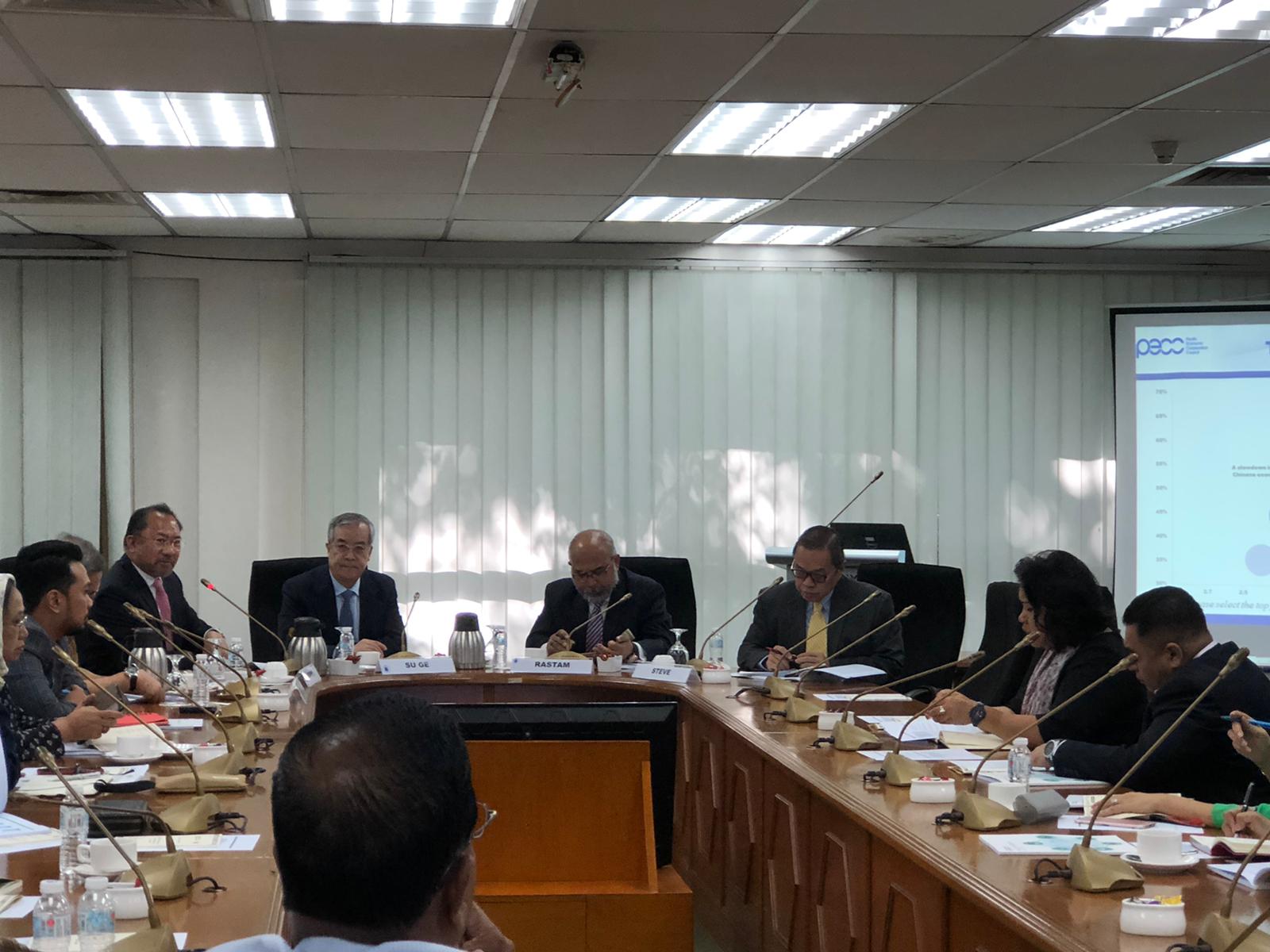State of the Region Report 2019-2020 Released in Kuala Lumpur
 The fourteenth annual PECC State of the Region 2019-2020 report was released today. The SOTR is an annual report from PECC’s on the major developments affecting Asia-Pacific regional cooperation. It contains a macroeconomic overview of the current state of the Asia-Pacific region, as well as the results of PECC's annual survey of the region's opinion leaders. This year, the survey was conducted from 5 August to 20 September and responses were received from 627 opinion leaders. The survey panelists were selected based on their expertise and direct involvement or influence on regional policy-making, coming from government, business and civil society.
The fourteenth annual PECC State of the Region 2019-2020 report was released today. The SOTR is an annual report from PECC’s on the major developments affecting Asia-Pacific regional cooperation. It contains a macroeconomic overview of the current state of the Asia-Pacific region, as well as the results of PECC's annual survey of the region's opinion leaders. This year, the survey was conducted from 5 August to 20 September and responses were received from 627 opinion leaders. The survey panelists were selected based on their expertise and direct involvement or influence on regional policy-making, coming from government, business and civil society.
The report shows the mood across Asia-Pacific has soured since last year with expectations for global growth turning distinctly negative. Regional economic growth is expected to slow from 3.8% in 2018 to 3.3% this year. Of greater concern is the sharp slowdown in the external sector with export growth slowing from 4% in 2018 to just 0.9% this year. While governments are acting to moderate a slowdown through stimulus measures and primarily interest rate cuts, other actions are also needed.
- Regional economic growth is expected to decrease to 3.3% in 2019.
- Export growth has slowed from 4% last year to just 0.9% this year for Asia-Pacific economies.
- 64% of policy makers most concerned over escalating protectionism.
- Only 26% agree that both APEC industrialized and developing economies have met the Bogor goals, while, 37% disagree.
- In spite of this, 68% say that APEC is just as important as it was when it was created.
- 83% of respondents highlight APEC’s ability to provide a platform for robust dialogue and effective cooperation among member economies.
- Education and skills issues top the list of issues to promote more people-oriented growth moving ahead, with 86% saying that education and training strategies to upskill the workforce are important or very important
The list of risks remains the same as in 2018, with the exception of a slowdown in the US economy entering the top five list. The US economy has been going through its longest ever economic expansion overtaking the boom that lasted from 1991 to 2001 that ended with the bursting of the dotcom bubble. The report speculates that there is potential for more to come in the form of increased protectionism and trade wars and a further slowdown in world trade growth – the top two risks in this year’s survey. However, it notes that governments are undertaking measures to forestall a slowdown through significant stimulus measures and recommends that these be complemented by significant economic reforms.
Ambassador Su Ge, PECC Co-Chair, said: “As one of the most important international governmental organizations of the region, APEC has made great achievements in promoting trade and investment liberalization and facilitation and enhancing economic and technical cooperation. As one of the three official observers of APEC. In recent years, we have seen notable uncertainties in the realm of global economic governance, including protectionism and risk of fragmentation of the regional economic integration. Next year, APEC will reach the milestones of 2020 which is the deadline for the Bogor Goals of free and open trade and investment in the Asia-Pacific. Therefore, for this year's SOTR, we chose to focus on the future of APEC.”
PECC’s report sets out stakeholder views on a range of issues that officials will grapple with throughout the next year with respect to the post-2020 vision for APEC.
The report also includes PECC’s innovative index on connectivity in the region. Eduardo Pedrosa, coordinator of the report said that, “Regional economic integration is not an end in itself. The ultimate objective is better quality of life and opportunity. Freer trade is a part of that, but we need the connectivity – the infrastructure, the ports, the customs, the education exchange and so on to make sure people are better able to benefit the enormous opportunities offered by trade – to make trade inclusive.”
Link to the report

 The fourteenth annual PECC State of the Region 2019-2020 report was released today. The SOTR is an annual report from PECC’s on the major developments affecting Asia-Pacific regional cooperation. It contains a macroeconomic overview of the current state of the Asia-Pacific region, as well as the results of PECC's annual survey of the region's opinion leaders. This year, the survey was conducted from 5 August to 20 September and responses were received from 627 opinion leaders. The survey panelists were selected based on their expertise and direct involvement or influence on regional policy-making, coming from government, business and civil society.
The fourteenth annual PECC State of the Region 2019-2020 report was released today. The SOTR is an annual report from PECC’s on the major developments affecting Asia-Pacific regional cooperation. It contains a macroeconomic overview of the current state of the Asia-Pacific region, as well as the results of PECC's annual survey of the region's opinion leaders. This year, the survey was conducted from 5 August to 20 September and responses were received from 627 opinion leaders. The survey panelists were selected based on their expertise and direct involvement or influence on regional policy-making, coming from government, business and civil society.